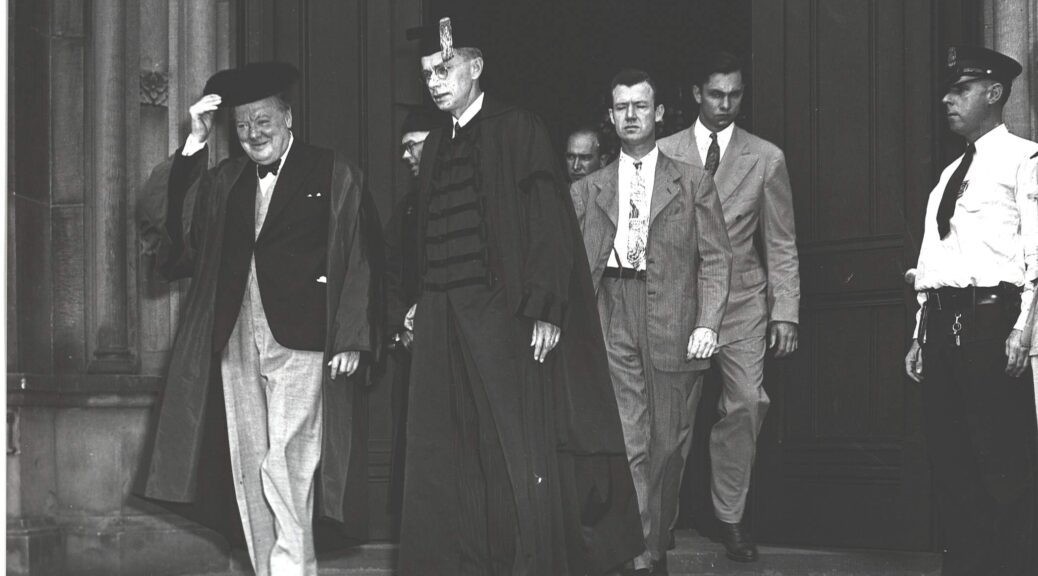
Winston Churchill: Not Much to Say Today?
Today and yesterday
“If a man is coming across the sea to kill you, you do everything in your power to make sure he dies before finishing his journey. That may be difficult, it may be painful, but at least it is simple. We are [today] entering a world of imponderables, and at every stage occasions for self-questioning arise. Only one link in the chain of destiny can be handled at a time.” —Winston S. Churchill, 18 February 1945
It was recently asserted that Churchill doesn’t have much to say to us today, and that the only people who use Churchill as a guide nowadays are “over-testosteroned American neocons.” Let me say this about that.
I don’t particularly care what “American neocons” think. Given the money raised and spent, the successes attained, and the enthusiastic reception of Churchill seminars, symposia and teacher institutes over the last forty years on what we can learn from Churchill—by Hillsdale College, the Churchill Centre, Ashland University, the College of William and Mary, George Washington University and the Churchill Museums in London and Fulton, to name a few—such a declaration seems incomprehensible.
The Soames Commandment
Churchill’s daughter’s famous commandment, “Thou shalt not say what my papa would do today,” is broadly misunderstood. She was referring to doctrinaire pronouncements about specific policies: because Churchill did W about X in 1935, he would do Y about Z today. Such a pronouncement is alike futile and foolish.
In a broader sense, however, Lady Soames agreed that his precepts, his principles, can be applied today. For example, her father talked about the primacy of conscience in his eulogy of Neville Chamberlain. He would follow that primacy if he were alive now.
Learning is so essential
Every turn of events has its unique features. Understanding them, and applying principles to them today, is still the challenge. The study of history depends upon finding truths that persist and are understandable across time.
The challenge for leaders today is to judge whether discretion should take priority over boldness, whether diplomacy is a feasible option, and when and where to deploy a bluff. In these areas, Churchill’s experience is an invaluable guide, because human nature is unchanging.
Was Churchill right that the Second World War was preventable? The answer, I think, is yes—at one juncture in particular—but with great difficulty.
Was he right that it is foolish to put off unpleasant reality “until self-preservation strikes its jarring gong”? Undoubtedly. There is nothing that dates that advice.
The sad story of Churchill’s failed attempt to prevent the greatest of wars reminds us once again of a maxim by someone other than he: The price of liberty is eternal vigilance.
________
Excerpted from the preface to my book, Churchill and the Avoidable War, an examination of his stance on the issues in the run-up to the Second World War from 1930 to 1939.
Further reading
“Conant, Churchill, and the Harvard of 1943,” 2023.







2 thoughts on “Winston Churchill: Not Much to Say Today?”
Whenever I need a respite from the yammering of today’s politicians — on both sides of the aisle — it is rejuvenating to reread Churchill’s comments on the problems of his day. His clarity of thought and the remarkable way in which he uses the English language, rather than mangling it, is a continuing delight.
— Carol Ferguson, Herald-Banner, Greenville, Texas
Wonderful quote; anyone who thinks Churchill is passé (or uninteresting) is a fool or a bigot or both. Churchill is wise; Churchill is witty and Churchill is a great literary voice, one of the greatest. He stands with the greatest authors in the English language—even with Shaw, perhaps higher since he was wiser. To me along with Dickens, Shakespeare and the Bible he is an indispensable English langauge author and orator. And don’t just trust me -trust John F. Kennedy and so many others who believed as I do. I look forward to your next book.
Comments are closed.